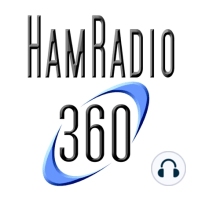49 min listen
Ham Radio 360: CW for the Newbie w/KI4WFJ Episode 41
FromHam Radio 360
ratings:
Length:
54 minutes
Released:
Dec 15, 2015
Format:
Podcast episode
Description
Ham Radio: CW for the Newbie! with Justin, KI4WFJ.
In a Fo Time First, we have a 'Studio' Guest. My Friend and Neighbor, Justin Hornby KI4WJF, came down to chat with us about Learning CW and getting your code on the air!
Justin has been licensed for a while now, and over the course of time had an on and off relationship with Morse Code...until Now! Justin got serious and finally took the bull by the horns. He shares with us his secrets to learning the Code and how he makes use of it as he continues to enjoy the hobby!
Make sure you check out his show notes below!
From Justin:
http://lcwo.net/
free browser based teaching tool; uses Koch method and has plain text training; I use this now to practice on lunch at work or whenever I want to practice without a radio.
http://morsefusion.com/
free week long trial but normally $9.99 a month; this is what I used to really get through learning the characters and practicing; I highly recommend.
http://www.skccgroup.com/
what sets SKCC apart is it's membership is free. Members are friendly and they have monthly scheduled activities that give a reason to get on and practice. Have morse elmer program for practice buddies and the sked page helps find contacts.
http://naqcc.info/
North America QRP CW Club; I also have joined the NAQCC and play in their contests and activities as well. Another friendly free club/group that has a lot of participation. Contests are laid back and fun; a great way to practice and improve your speed once on the air.
My kit radio: http://www.qrpkits.com/pfr3.html
Check Ebay or junk boxes at hamfests for straight keys--try to get one that is fully adjustable--bearings,spring force,gap; it makes all the difference in the 'feel' of the key; I use this one:
http://www.ebay.com/itm/NOS-Vintage-Classic-Oval-Speed-X-Telegraph-Key-c-1967-Nye-H15-682-New-/161911306817?hash=item25b2aa7a41:g:LzkAAOSw9mFWGtS1
The capacitive touch paddles I have I use sometimes is model P6:
http://www.cwtouchkeyer.com/home.htm
http://www.americanmorse.com/
A practice sidetone oscillator helps to get timing and feel for sending-just practice imitating sending good code you have listened to.; many radios can be setup to create the sidetone w/o transmitting for practicing; the IC-718 can do this
The ARRL W1AW practice transmissions are a good way to get used to listening to morse over the radio and practice decoding before jumping in making QSOs. There's a big change between listening to practice code on the computer and dealing with QRM and QSB!! Also, all the files, text and mp3 are available on the website so you can listen, decode, and check your work w/o having to stick to the broadcast schedule or have a radio handy.
http://www.arrl.org/code-practice-files
http://www.arrl.org/w1aw-operating-schedule
73, K4CDN
In a Fo Time First, we have a 'Studio' Guest. My Friend and Neighbor, Justin Hornby KI4WJF, came down to chat with us about Learning CW and getting your code on the air!
Justin has been licensed for a while now, and over the course of time had an on and off relationship with Morse Code...until Now! Justin got serious and finally took the bull by the horns. He shares with us his secrets to learning the Code and how he makes use of it as he continues to enjoy the hobby!
Make sure you check out his show notes below!
From Justin:
http://lcwo.net/
free browser based teaching tool; uses Koch method and has plain text training; I use this now to practice on lunch at work or whenever I want to practice without a radio.
http://morsefusion.com/
free week long trial but normally $9.99 a month; this is what I used to really get through learning the characters and practicing; I highly recommend.
http://www.skccgroup.com/
what sets SKCC apart is it's membership is free. Members are friendly and they have monthly scheduled activities that give a reason to get on and practice. Have morse elmer program for practice buddies and the sked page helps find contacts.
http://naqcc.info/
North America QRP CW Club; I also have joined the NAQCC and play in their contests and activities as well. Another friendly free club/group that has a lot of participation. Contests are laid back and fun; a great way to practice and improve your speed once on the air.
My kit radio: http://www.qrpkits.com/pfr3.html
Check Ebay or junk boxes at hamfests for straight keys--try to get one that is fully adjustable--bearings,spring force,gap; it makes all the difference in the 'feel' of the key; I use this one:
http://www.ebay.com/itm/NOS-Vintage-Classic-Oval-Speed-X-Telegraph-Key-c-1967-Nye-H15-682-New-/161911306817?hash=item25b2aa7a41:g:LzkAAOSw9mFWGtS1
The capacitive touch paddles I have I use sometimes is model P6:
http://www.cwtouchkeyer.com/home.htm
http://www.americanmorse.com/
A practice sidetone oscillator helps to get timing and feel for sending-just practice imitating sending good code you have listened to.; many radios can be setup to create the sidetone w/o transmitting for practicing; the IC-718 can do this
The ARRL W1AW practice transmissions are a good way to get used to listening to morse over the radio and practice decoding before jumping in making QSOs. There's a big change between listening to practice code on the computer and dealing with QRM and QSB!! Also, all the files, text and mp3 are available on the website so you can listen, decode, and check your work w/o having to stick to the broadcast schedule or have a radio handy.
http://www.arrl.org/code-practice-files
http://www.arrl.org/w1aw-operating-schedule
73, K4CDN
Released:
Dec 15, 2015
Format:
Podcast episode
Titles in the series (99)
Ham Radio 360: ARES responds to the Joplin Tornado-a look back with AC0HA: - In the Premiere Fo Time Podcast we visit with Cecil Higgins, AC0HA. Cecil was the 'Ham In Charge' during the ARES response to the Joplin MO Tornado Disaster in 2011. We discuss disaster response, the multiple roles of amateur operators in disast... by Ham Radio 360
